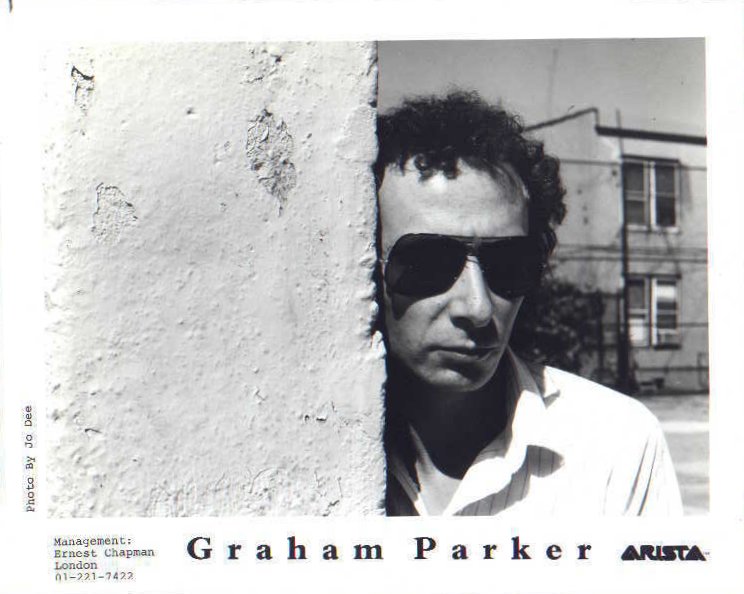

BIOGRAPHY
ARISTA RECORDS, INC.
ARISTA BUILDING
6 WEST 57 STREET NEW YORK, N.Y. 10019
One element that is ever-present in Graham Parker's music, on his new album The Real Macaw as much as on any of the earlier albums that made him one of rock's key figures, is an honesty and directness; his themes have kept shifting, he's worked with various producers and different combinations of musicians, but the core has remained constant. As one critic wrote, Parker's songs come 'straight from a passion that lies recognizably in the essence of all great rock music."
When Graham Parker emerged in 1976, rock was in the throes of a mid-decade, pre-punk doldrums; the fiesty sound of Parker and his band The Rumour was a signal that things were about to change. "At the time," Parker's said, "we were extraordinarily new. I realized I was writing better songs than were on the radio, and I was going to other sources to get the songs: country, blues and reggae, and bringing them together into modern music. It was a new kind of energy." And as someone who grew up on soul music, Parker never let go of the feeling that music should have emotional impact.
The first music heard from this remarkable band -- the albums Howlin' Wind, Heat Treatment and promo-only Live At Marble Arch, the Pink Parker EP -- was immediateley recognized as something of significance for what it accomplished and what it heralded. At the end of '76, Rolling Stone named them best new band, and their two LPs both wound up in the top four in the annual Village Voice critic's poll. Before changing record label affiliation in 1979, Parker and The Rumour cut two more albums, Stick To Me and a double live set, The Parkerilla.
Leaving his former company with a pointed farewell ("Mercury Poisoning"), Parker signed with Arista and went into the studio with producer Jack Nitzsche. The issue of that collaboration was Squeezing Out Sparks, named by critical consensus (in the Voice poll) the best album of the year. There was one final LP with The Rumour, The Up Escalator, after which Parker felt it was time to move on.
"It was easy to have a solid band that's always there," he admitted to Musician, "but it wasn't risky enough. With a new band you're taking risks, you're going to have more excitement, and you're not getting stale. You have to work harder." The Boston Phoenix called the first post-Rumour GP LP, Another Grey Area, more subtle and controlled than the heated, cliff's-edge desperation with his former band, but its songs, his most brilliant since Squeezing Out Sparks, reveal a new, if softer, sophistication."
The Real Macaw, produced by David Kershenbaum (whose recent credits include co-producing Night And Day with Joe Jackson and remixing Duran Duran's Rio), assembles a basic band consisting of Parker and Brinsley Schwarz (ex-Rumour) on guitars, George Small on keyboards, Kevin Jenkins on bass and Gilson Lavis (ex-Squeeze) on drums. Filled with songs that uncover an upbeat romanticism ("Life Gets Better," "A Miracle A Minute," "Last Couple On The Dance Floor"), the LP also retains Parker's flinty edge: "Passive Resistance" has a gentle melody that surrounds a bitter indictment of radio, and "Just Like A Man," "Sounds Like Chains," "You Can't Take Love For Granted" and "Glass Jaw" all contain some of Parker's most incisive lyrics.
As Parker said to the Chicago
Tribune, "I think my songs are full of optimism. As long
as you can say what you're thinking, you're optimistic. It's when
you can't express yourself, or when you're groping in the dark,
that you're in trouble."
Back to GP album discography | GP promos and more